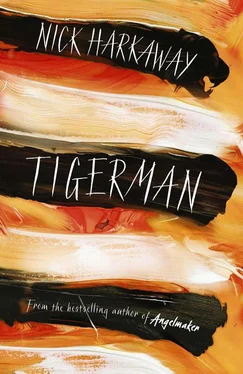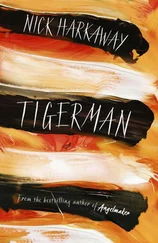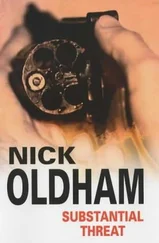Pursuant to his other investigation — the one which related to his long-term solution for the boy’s evacuation — the Sergeant asked Beneseffe casually if he knew who his friend’s parents were.
‘Which boy?’ the Portmaster responded.
‘The one who’s always around. Comic books and a big old cellphone. Slim, dark hair. Smart.’
For a moment he thought Beneseffe might actually be able to tell him. There was a flicker of recognition in his face. Perhaps it was common knowledge. That boy who was orphaned in the storm of ’02, whose parents died of a fever, who survived the car crash back in ’09 . Perhaps this would be simple. But Beneseffe shook his head. There were a lot of boys on Mancreu, even now. ‘Ask at the schoolhouse,’ he suggested.
‘He doesn’t go to school.’
‘If he doesn’t and he should then they’ll know who he is, won’t they?’ Beneseffe pointed out, his tone implying that if this was detective work he considered it easier than people believed.
And they might know, at that, the Sergeant thought. Absence might be conspicuous. He would ask — but not today. Tomorrow. If he asked too many questions all at once, people would notice. The boy might find out about it indirectly, and that was not part of the plan.
Standing outside in the sunlight, he considered his idea of dropping in on the Witch as if by accident, but felt now that this would amount to an imposition of his presence. She must recognise it for what it was: a loneliness, and an approach. It would be better instead to make overt what was in his mind. Send her flowers. Ask her out. She was quite capable of refusing him with grace and making the matter relatively painless, he knew that. He wondered if she liked to read, as well as to play music. He had books he could lend her. Perhaps they would swap books. Perhaps reading would become an evening together, and between pages of a novel she would undress, and kiss him.
He sighed. He should have made his proposition months ago. It might have been possible. Now there was a fatigue about his desire, as if they had been lovers for too long and the flame was guttering, leaving them with a comfortable friendship and nothing more. His mind offered him visions of her, and his body was keen enough to accept the notion, but more and more they came with the hollow familiarity of repetition, and faded away without heat.
Seagulls landed all around him in a cloud, shrieking. One of the open boats was coming in, the bait high and vile in the air. The Witch was banished. Well, now he could not go and see her. Her skin was muddled in his mind with the smell of drying mackerel. Hardly good kindling.
At a loose end, he went out onto the seafront and sat with his feet dangling over the edge of the dock like a child. The dog? The mugging?
Mancreu shuddered, and he rolled himself hastily away from the water’s edge. He had no desire to take a dip in the diesel-filmed harbour, swallowing seagull shit and oil. He stretched out a hand to steady himself on the cobbles.
The tremor faded.
He settled, resuming his seat, and listened to the sounds behind him in the town. Someone was brushing a broken bottle into a pan, and over on the other side of the Portmaster’s office a lobsterman was chasing a stray lobster along the ground. The Sergeant laughed, but then the man turned and he was wearing a cheap surfing T-shirt, and it was — absurdly — one he had seen before, dozens of times, in Afghanistan. Someone must have donated a crate of them, because the kids all wore them when they went to school.
He sighed. Afghanistan had been a mess. The Americans called it a Total Goatfuck, and they laughed and swore and kept their spirits up by firing huge bombs into the cave systems. Several of the local section commanders had taken to wearing stetsons and sheriff’s badges when they went out in public, and one actually made a temporary drive-in and screened a bunch of cowboy movies dubbed into Pashtun and Farsi. ‘I want them to know where we’re coming from,’ he said. ‘I want them to understand that this is how we do.’ The Afghans watched the movies, some from the makeshift benches in the drive-in and some through field glasses from up in the hills, and there was a great deal of debate over coffee and raisins about whether Rooster Cogburn really did have true grit. Then one morning the projectionist was found with the second reel of High Noon pushed into his open chest.
‘What the fuck did he expect?’ the Sergeant overheard a senior officer say to a visiting member of the general staff. ‘He sent his message, and they sent one back. Their message isn’t a lot more insane than his, it’s just in capital fucking letters!’ And then, to everyone’s surprise and embarrassment, the man wept.
The Brits didn’t talk about Afghanistan being a Total Goatfuck. That didn’t come close to expressing how they felt. They had a sense of having been here before, a sense they got from their regimental histories and from the Afghans themselves, who still recognised the flags they flew and the badges on their shoulders from the wars of a hundred years ago. There were soldiers here whose great-grandfathers had fought the Pashtuns in 1918, and the fathers of those men had fought them before that in 1879, and their fathers in 1840. The Brits shared with the locals a tacit understanding that nothing done here would make any difference, that this was just another layer of bloody patina on the cold, hard soil.
Command gave the Sergeant a new second lieutenant to take care of, a boy called Westcott. He was posh as Royal Doulton and thick as a carthorse. He said the war was going to be ‘an improvement for everyone in the long run’. He let it be known that he liked his men to read, because he felt it improved their chances of ‘getting a good position’ when they got home.
The Sergeant, like many men whose jobs involve a great deal of waiting, enjoyed reading. He carried one paperback wherever he went. He had a small library in his locker and selected something different each time he packed his gear. He had Three Men in a Boat and The Passion and The Hound of the Baskervilles , a few old Eric Frank Russell editions, and a copy of Bleak House for the winter. Westcott said he should invest in an electronic book tablet. They could store thousands of books, Westcott said, and they lasted for weeks between charges. A couple of the soldiers already had them, Westcott said, and really liked them. Progress was what it was all about. When he was out of the army, he was going into business and then later when he knew a thing or two he might stand for Parliament — that was giving back, which a person in Westcott’s position really ought to do.
Two weeks on, Westcott was reading from his gizmo in a ravine when the sky opened white and purple and bullets poured down. The machine had brought the Taliban right to him; it had a cellular connection Westcott had forgotten to switch off, or maybe he couldn’t wait for the latest Grisham and had tried to bloody download it. The Sergeant dragged two men through the howling night and hid them in the stripped carcass of a bus, then went back and found that Westcott had been cut in half. The enemy was a gaggle of boys and an older man, and one of the kids had a box with wires poking out which was their uplink detector. They were dancing and celebrating.
Blue Peter , the Sergeant thought. My Science Project. I’m fighting sticky-backed plastic and cornflakes packets . He was only dimly aware of being injured.
A day later, the whole valley was made of glass. The daisy-cutters weren’t classed as weapons of mass destruction because they weren’t nukes, but they worked just as well by being very big. They were so big they had to be pushed out of the back of carrier planes one by one, down the ramp usually used for tanks and trucks. Each of them was a natural disaster in a box. The air for miles in any direction smelled of oil, hot stone, and charred sheep. The Sergeant sat in the back of a truck with his legs hanging down over the road and watched. Someone had thought it might be a good notion for him to know that the men who had killed Westcott weren’t getting away with it. Privately, he thought that whoever that person was must be new here. Still, it wouldn’t do to be ungrateful. He recited the whole of a poem he knew about a cat. For a while, it seemed to be all he could say. When he found other words, they were jagged and inappropriate, full of a sense of waste.
Читать дальше
Конец ознакомительного отрывка
Купить книгу











